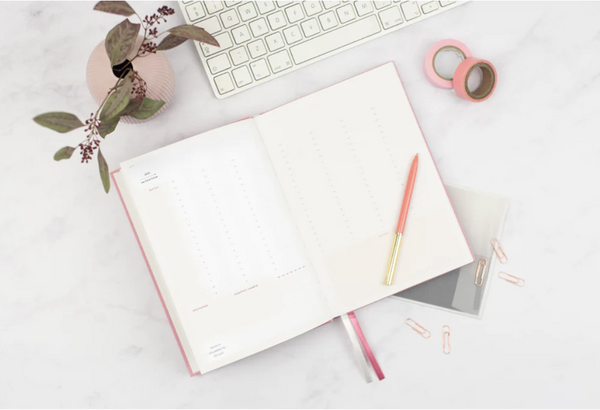Everything we consume comes at a price - whether a financial cost, a cost to the environment, or a cost to us energetically. Making sustainable choices might seem like a trendy marketing ploy to get us to spend more money, but in reality, being eco-friendly is essential for our own health, as well as the health of the planet.
The sustainably made Ponderlily Planner, a practical addition to any work from home desk.
What is Sustainable Stationery and Why Does it Matter?
One choice we can make, although small, can make a big difference in the long run - that is the purchasing and consumption of stationery.
Stationery isn't just the traditional image that comes to mind of writing letters and stuffing them in their matching envelopes, stationery also includes all kinds of mass-produced writing materials and paper.
From printer paper, to planners, to journals, and everything in between, whether someone will handwrite on the paper or have it printed on. It is all stationery.
Enter: sustainable stationery. Sustainable development, as defined by Brundtland Commission, "meets the needs of the present without compromising the ability of future generations to meet their own needs".
Stationery is produced on an incredible scale - I can't imagine how much stationery gets used up in Fortune 500 businesses and massive office buildings, then count in all of the stationery used at almost every business out there - letterhead, flyers, notepads, marketing materials, office materials - at schools, and then even further to the stationery consumed in homes.
We have a potentially big problem. These stationery products have the potential to make a huge impact on the environment. It’s up to us whether that impact will be positive or negative.
Collective Action Creates Collective Shifts
If one customer buys one sustainably made daily planner, it might not make much of a difference in protecting the environment.
If thousands of people buy sustainable stationery, and then thousands of businesses buy sustainable stationery, that mindful choice continues to snowball. Companies who aren't sustainably focused will perk their ears up and hear the cry of our dollars, our choices, our values.
We can't control what stationery is used in big businesses, but we can control how we consume. On an individual level, our buying habits might not make as much of a difference to the environment (although it can make a huge difference to our own mental health) but collective action creates collective shifts.
This is how organic products become more mainstream, how harmful pesticides get banned, how shifts in power occur, how businesses reshape their values.
When consumers speak with their dollars, companies listen. Our purchases of sustainable stationery (and all of our purchases, in reality) count as our vote, our voice.
Our purchase tells businesses what we value, contributes to protecting the environment for future generations, and gives us peace of mind that we are living in a way that feels true to our values - not just in our words, but in our actions.
5 Ways To Make Your Stationery Choices More Sustainable This Year
1. Know The Company You Are Buying From
Brands have a choice whether to be transparent about their processes or not.
As far as I’m concerned, there are enough brands out there who are being transparent in almost every single market, including the stationery market, that there is no reason to purchase from a brand who refuses to share their environmental practices and impact.
When making a purchase, especially for something that you will be using every day - like a planner or even a mattress - poke around on their website. Email the company and ask questions. Shop around.
Cost can be a factor when purchasing products, but many brands are working hard to keep costs low, while still maintaining quality, style, and environmental friendliness.
The more we purchase those eco-conscious products, and the higher that demand goes, the lower the costs can go, because the products can be produced more efficiently to meet the demand, ultimately benefiting everyone.
Read more about our sustainability efforts at Ponderlily!
2. Find Ways to Reduce Waste
Can you use a planner for more than just tracking a schedule? Maybe use your planner as a journal, a mind map, or a place to balance your budget.
I carry my Ponderlily Planner around with me and take notes for yoga sequences that pop into my head that I want to teach in my classes, and quotes or stories that I think would make a great short story to share later.
Reducing waste means bringing reusable bags, or shopping from companies who refuse to douse their products in non-biodegradable packaging.
At Ponderlily, recyclable packaging, water-activated print tape and kraft paper boxes make recycling easier, as well as biodegradable packing peanuts and manufacturing close to our home in Newcastle, UK to reduce the carbon footprint.
Businesses can create sustainable products, but many of them don’t because why should they if people continue to buy their products?
Find ways to reduce waste in the home, in your purchases, as well as supporting businesses who operate sustainably and make an impact on a larger scale.
3. Research & Make Sustainable Choices
Make your voice heard by only purchasing stationery from brands who are transparent. There are tons of options out there for buying stationery, from inside a convenience store, to shopping online.
A planner is a tool you will use for an entire year, ideally. A journal is something you will use until there are no more blank pages. Make your purchase count as far as sustainability for the environment goes, but also sustainability for yourself as an individual.
It can be hard to keep up with a traditional planner; a to-do list that never seems to end, day in and day out. Ponderlily Planners change the name of the game here.
You become empowered by your Ponderlily Planner. This journal is a product that works hard to protect the environment while also working hard to meet the needs of the consumer in a way that boosts their energy, rather than depleting it as one more thing to do.
4. Recycle It When You're Done.
This prompt is easy. Instead of throwing away paper products, stationery products, notes, journals, planners - recycle them.
Create a separate bin for stationery items if you must, to remind you to toss that paper in recycling instead of the bin. Recycling is such a simple act, which can make a big impact.
Take it to another level by demanding big businesses create recycling programmes for their shipping materials, packing materials, and waste. The power of the people is real. Believe in the power. Use it!
5. Educate Others About Sustainability and Sustainable Stationery Brands.
Introducing people to sustainable businesses is a simple method that has withstood the test of time, marketing, and the digital age. Word-of-mouth.
To create an impact that is more than just on the individual level, tell your friends and family about eco-friendly products. Tell your coworkers about the eco-conscious swaps you've made. Tell your Instagram following about the sustainable businesses you love.
When you find a brand that you love, buy from and value, tell people! Sharing information about sustainability is such a simple act, which ripples out. You tell someone, they tell someone, and before you know it, sustainable brands are boosted up next to the big, faceless businesses.
Ponderlily Travel Planner and "Today" Notepad, perfect for organising your day at the home office or on the move.
Sustainability on the Inside
Are the things we are consuming nourishing our body and mind? Filling our cups or draining it? Sustainability doesn't always have to do with external factors, it can also factor into our psyche.
Is keeping up with a daily to-do list sustainable for you? Or would it make more sense to keep up with a "to be" list, a dream list, a space to find encouragement and empowerment in who you are and where you are right now?
Every interaction we have, whether with ourselves, with others, and as consumers, requires energy. A payment of sorts. So choosing what we consume and how we consume it is critical for our physical, mental, and environmental health.
It’s possible, and even easy, to make sustainable stationery choices this year. So what are you waiting for?





